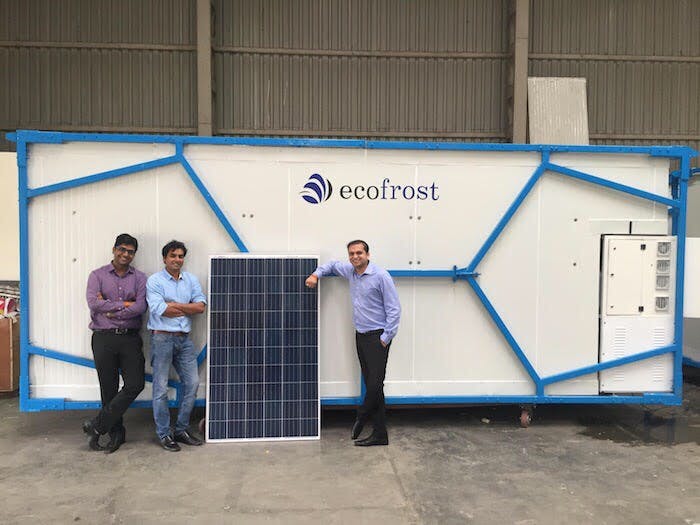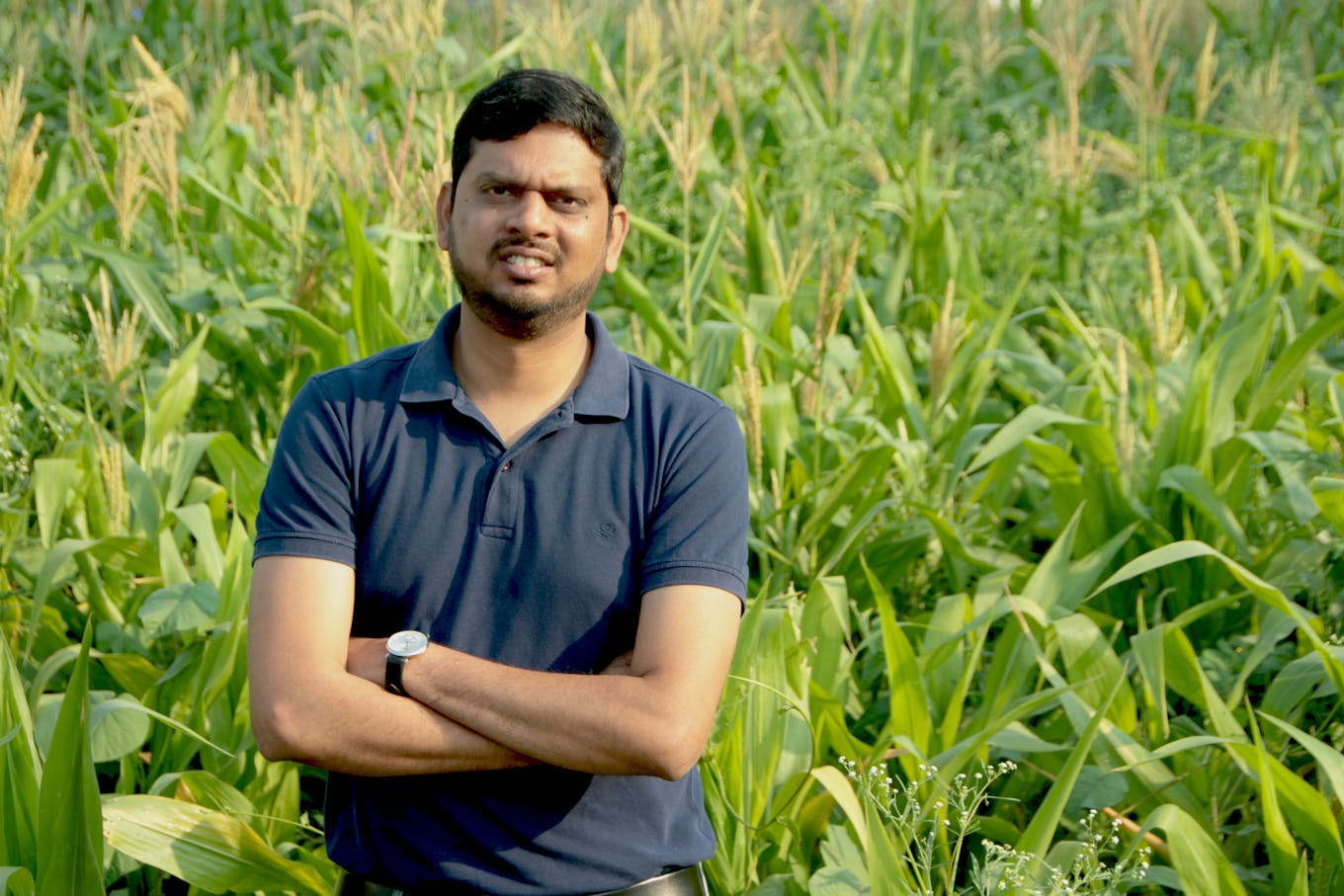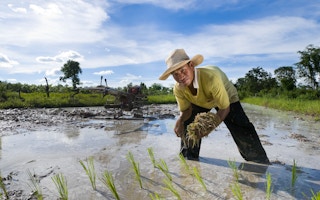When Prateek Singhal and two friends devised a solar pump to help Indian farmers tap water from wells to irrigate their crops, they were ecstatic.
But they soon noticed that the growth in farmers’ incomes did not match their increase in production, as some fresh flowers, fruit and vegetables spoiled before even reaching the market due to the lack of cold-room facilities.
This made Singhal and his Ecozen Solutions co-founders Devendra Gupta and Vivek Pandey think seriously about the need for post-harvest management at the “first mile” of the food supply chain. The result was Ecofrost, a solar-powered cold room that allows farmers to keep their crops chilled for up to 30 hours, giving them more time to find the right buyers.
With a five-tonne capacity, Ecofrost has helped farmers cut loss and wastage by 20 per cent and boosted their incomes by 50 per cent—in some cases, even by 100 per cent, said Singhal, the company’s chief operating officer.
There are now more than 150 Ecofrost units in use across India, including more than 25 units that are leased out.

Ecozen Solutions co-founders (from left) Prateek Singhal, Vivek Pandey and Devendra Gupta. Their Ecofrost cold room helps farmers cut wastage of produce. Image: Ecozen Solutions
The United Nations’ Food and Agriculture Organisation (FAO) estimates that roughly one-third of the food produced for human consumption each year is lost or wasted, amounting to a staggering 1.3 billion tonnes.
But food loss and waste is only one aspect of the US$5 trillion food and agribusiness industry’s negative impact on the environment. Agriculture is a water guzzler and major source of pollution and carbon emissions. It is the world’s largest source of non-carbon-dioxide greenhouse gas emissions.
Given these facts, the agriculture sector has “no choice” but to push for sustainability, said Arindom Datta, Rabobank’s executive director and head, Rural and Development Banking/Advisory.
However, there is a high level of fragmentation in the supply chain and among crop producers, and many big agribusiness players in India and Southeast Asia rely on local traders to procure commodities.
“It’s too expensive for current supply chain players—the large corporates, retailers, processors—to engage thousands of smallholder farmers in a meaningful way,” said Datta. “They don’t have a relationship with the farmers, they can procure from anywhere; they do not invest at the farmers’ level. That remains the biggest problem in Asia.”
As a result, there are large bases of smallholder farmers who bear the highest risk in the supply chain but who lack access to knowledge, finance and markets.
Building a better supply chain
Enter technology. Entrepreneurs are in a race to develop hardware and software solutions to make life better for farmers, ensure traceability in the supply chain and make a positive environmental impact through better farming practices and waste reduction.
Agri-technology entrepreneurs have to communicate in ways that are understandable to farmers. They also need to ensure that their products and services catering to farmers are priced within reach of their customers, or develop creative business models.
Ecozen commercially launched its “lease a cold room” model at the end of 2017 to cater to farmers who harvest their produce for only three to six months a year, and to help others manage the upfront capital cost of an Ecofrost, which has a payback period of three to four years, said Singhal. Leasing prices vary by commodity and business model, he added.
Technologies such as machine learning and artificial intelligence allow for end-to-end traceability of commodities, improving food safety and allowing greater oversight of the supply chain, said Datta.
With virtual aggregation, market players such as warehousing companies, exporters, food processors and bankers have access to credible information about farmers and the volume and quality of their produce, he said.
For farmers, data can mean “growing the right produce at the right time in a way that’s climate-friendly, and for which there’s demand in the market”.
“
My sense is, it’s the agri-tech companies that are going to show the way (on) what technology or processes are the most efficient to make this happen.
Arindom Datta, executive director and head, Rural and Development Banking/Advisory, Rabobank
To shine the spotlight on solutions offered by agri-tech start-ups, the Netherlands-headquartered Rabobank organised the Food Loss Challenge Asia last year. The challenge drew 127 applicants and Ecozen emerged as the eventual winner, clinching the top prize of US$15,000 and the audience’s prize of US$5,000.
The win offered opportunities for Singhal and his team to meet the top management of leading food and agribusiness players and commodity traders, and a chance to go to Kenya to study the market. Through the competition, Ecozen gained more visibility and global recognition, said Singhal.
Another finalist that stood out was CropIn. Set up by former GE employee Krishna Kumar to bridge the data asymmetry among farmers, their suppliers, government bodies and banks that results in low farm yield and other challenges, CropIn’s suite of products includes SmartFarm and SmartRisk. SmartFarm is a customisable mobile app and web interface for businesses and farmers to manage farming plots, while SmartRisk is a predictive and prescriptive AI platform built on over 2 trillion datasets including ground data, satellite imagery, weather and other sources that provides insights on crop yield and other key parameters.
The company has over 2.1 million farmers on its platform and aims to improve their yields through timely advice on good agricultural practices, pest and disease management and the weather. Co-founder and chief operating officer Kunal Prasad said the competition enabled CropIn to identify new partners in the Southeast Asian region.

CropIn, founded by Krishna Kumar, works with 2.1 million farmers managing 384 crops and 3,662 crop varieties in 46 countries. Image: CropIn
This year, Rabobank’s innovation challenge is called the SustainableAg Asia Challenge. Launched on August 1, it aims to create a platform for exchange and discussion among solution providers and companies that are seeking ways to become more sustainable. The challenge will showcase solutions that tackle risks from an increasingly complex supply chain. Applications close on September 1 and start-ups with technologies to promote precision agriculture, food safety and data integrity are encouraged to throw their hat into the ring.
Besides the challenge, Rabobank’s strategic investment arm Rabo Frontier Ventures invests in agri-tech and financial technology companies. It recently made its first investment in an Asian company—Indian start-up Agrostar which, among other things, has developed an app equipped with tools such as crop disease diagnosis and an e-commerce store for farmers.
The lifeline of working capital
Despite their potential, agri-tech start-ups face challenges in financing as they may not be deemed bankable by mainstream financial institutions—either because of losses or weak financial statements in the initial years, or because they do not have assets or collateral, said Datta. This hampers their access to working capital.
Few start-ups are able to attract credible venture capital funds and not only is equity raising time-consuming, it is hard to predict when they will successfully raise the next round of capital, said Datta. Yet, these companies need funds to fulfil any contracts with larger clients.
In response, Rabobank and impact investor Caspian created an INR150 million (US$2.12 million) working capital facility that agri-tech companies in India can tap to implement projects and pay back when they get money from clients.
Launched in August, the Rabo-Caspian Agtech Financing Fund will provide customised debt solutions to data-driven companies delivering products or services that help improve the productivity and income of smallholder farmers.
Datta is bullish that these companies can help shape a more sustainable industry. “My sense is, it’s the agri-tech companies that are going to show the way [on] what technology or processes are the most efficient to make this happen,” he said. “Agri-tech is special to Rabobank because we are the world’s leading financier to the food and agribusiness sector.”




















